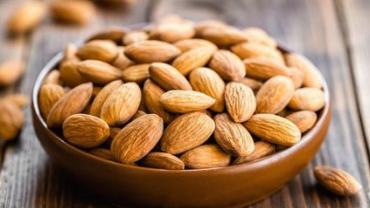
Nuts as we have come to understand are nutritious and wholesome foods. Among the wide variety of delicious nuts commonly available almonds stand out as uniquely versatile which may account for their popularity. Almonds can be employed in sweet and savory dishes alike. Sliced or slivered almonds can add crunch to salads while a spoonful or two of smooth almond butter lends healthy fat and a creamy consistency to smoothies. Almond flour made from nothing but pulverized almonds allows those with allergies or sensitivities to gluten and other grains to enjoy grain-free cookies crackers and other baked goods that would otherwise be off-limits. They’re low-carb and Paleo-friendly and provide healthy fats and protein for those who prefer to follow vegetarian or vegan diets. Delicious as they are however almonds and almond butter are less likely to lead to over-consumption than peanuts and peanut butter even the plain unsweetened variety. With all this going for them the fact that almond consumption is associated with good health is really just icing on the almond flour cake.
Like most other nuts almonds are a good source of minerals and unsaturated fats. The standard serving size of one ounce provides 32% of the daily value (DV) for manganese 19% of the DV for magnesium 14% for copper 17% for riboflavin and a whopping 37% for vitamin E—an important antioxidant nutrient that is hard to come by naturally in the modern food supply. Almonds are a relatively high-fat food but of the 14 grams total fat per serving over half (8.7g) is monounsaturated the majority of which is oleic acid—the one believed to be responsible for many of olive oil’s health-promoting properties. Almonds contain about 3.4g of polyunsaturated fat per serving. There’s a negligible amount of omega-3 fatty acids but with just 3.4g of omega-6 the n-6 to n-3 ratio isn’t unreasonably high.
An ounce of almonds provides around 6g of carbohydrate half of which come from fiber making almonds a great snack for those looking to control appetite without spiking blood sugar. In fact including almonds with a relatively high-glycemic breakfast of a bagel butter and juice resulted in reduced post-prandial blood glucose in type-2 diabetics. This was achieved without significant effects on blood insulin levels which suggests that rather than increasing insulin in order to reduce the blood sugar the almonds themselves led to a more moderate rise in blood glucose likely owing to their fat and fiber content. Other studies show that in healthy subjects there is a dose-dependent reduction in the glycemic impact of a high-carbohydrate meal when almonds are added. Healthy subjects who consumed 50g of carbohydrate in the form of white bread had significantly lower 2-hour area under the curve for blood glucose when one two or three ounces of almonds were added with higher amounts leading to lower blood glucose excursions.
Almonds may also have benefits when eaten as snacks. When eaten approximately two hours apart from meals almonds helped curb hunger and desire to eat during subsequent acute feeding windows. Longer-term consumption of nuts as snacks may lead people to spontaneously decrease total food consumption at meal times which may help with weight loss. Almonds and other nuts are a good choice for snacks compared to refined carbohydrates and sugars which will elevate blood glucose and insulin and likely induce greater hunger a short time later.
Increased satiety and beneficial glycemic modulation aren’t the only positive effects from eating almonds. Almond consumption like that of many other nuts is associated with beneficial changes to blood lipids. Study results are mixed but overall eating almonds may lower total cholesterol and LDL-C while having no adverse effects on HDL-C. Their cholesterol-lowering effect and reputation for being generally protective for cardiovascular health may be due to their unsaturated fats plant sterols and α-tocopherol arginine and magnesium content.
With so much confusion among the general public about healthy fats it’s nice to be able to feel confident about recommending almonds and almond butter as healthful and nutritious snacks for patients.